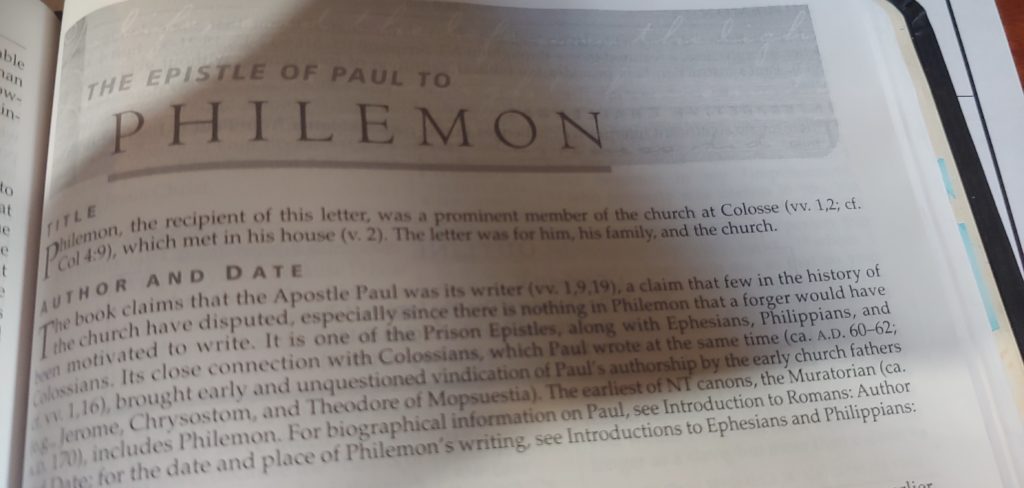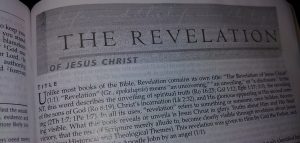
The letter to Philemon was probably written at the same time as the Colossian and Ephesian letters. This means that they were written during a period which we have identified as Paul’s first imprisonment in Rome, as described at the end of the Book of Acts. I say this because all three letters were carried by Tychicus to their destinations.
There are only two periods in church history where the authorship of this book is debated at all. The first of those times is the theological disputes of the 4th century (the 300s), where some put forward this letter to be excluded from the canon of Scripture because it contains no doctrine, and thus could not have been authored by Paul. This was refuted by none other than the church fathers Jerome, Chrysostom, and Theodore of Mopseustia. The other time was liberal theologians of the 19th century (1800s) attacking the sufficiency and inerrancy of Scripture as usual. Their argument was that this letter should be rejected for the same reasons that the other prison letters should be rejected, but as we have seen in our previous studies, these arguments have no basis in fact or even logic, so we may ignore them.
What we know about Philemon comes strictly from this letter. We know that he was a wealthy man, probably a business man, because he owned at least one slave, who we also know from this chapter. We’ll say more about him in a minute. We know that the Colossian church met in his home, so that means he likely had a larger home, or at least one with a great room into which all the saints could fit for meetings. From the text, we can deduce he was married to Apphia whom Paul names, and from the positioning of the greeting, we may be able to assume that Archippus is his adult son. We know that Archippus is in the ministry with Paul because Paul calls him a fellow soldier in 2 Tim 2:3. It is possible that he was a pastor in the church at Colossae, and in the sister cities of Laodicea and Hierapolis.
The general theory is that Paul led Philemon to Christ while Philemon was in Ephesus on his business, whatever that may have been. We DO know that it was Paul that led him to faith in Christ because of v.19 of this chapter where Paul reminds Philemon of that fact. We do not know how Archippus came to Christ, but it is reasonable to assume that Paul led him to Christ. Apphia, one can assume that it was Philemon himself that led her to faith, as that was just how the gospel would spread rapidly in those days.
Onesimus was the name of the slave of Philemon. The name itself was common as a slave name, as it simply means “useful.” We don’t know if that was his real name or if this was just a clever word play, or some form of identity protection. Whatever else you may say about Onesimus, you can assume that he had been a naughty slave – he likely stole money from Philemon and then ran away to Rome, hoping to lose himself in the mass of people there. This was a common thing for runaway slaves to do, and there was even an area of Rome where these kinds of people went to hide. There was a subculture of it in the entire empire. Rome lived in fear of a slave rebellion at all times, in fact, and this made the punishment for runaway slaves harsh in the extreme should they be caught. Onesimus had jumped out of the proverbial frying pan and into the fire if he was looking for easy street as a way of life.
Now I really need to say a word here about the sovereignty of God. If you have heard any of my preaching recently, you know that I have spoken in detail about that very subject, and you know that an informed view of God has Him as the Sovereign of the Universe, and to Him, there is nowhere that cannot be clearly seen and intimately known. There is NOWHERE to hide, and to our sovereign God, there is not one stray atom in the entire universe. Onesimus thinks he is hiding. And then he runs into someone whom he may have known already – the Apostle Paul, who “just happens” to be in Rome to speak his case before Caesar. What a coincidence! Kidding! There is no such thing as coincidence. Rather I would say what providence! And one thing leads to another, and Paul leads Onesimus to Christ! Yeah, fie on your coincidence.
Paul understands the ramifications instantly. As a Christian now, he needs to be reconciled with his master Philemon, whom Onesimus has in fact wronged by potentially stealing from him, and by not fulfilling his slave contract with Philemon.
That is the background story as to what is addressed in the book itself. From here, commentators begin to diverge based on their doctrinal bents. I have literally heard this chapter described as everything from Paul’s personal diatribe against slavery to the book with no theology at all. After a very careful reading of this book, I think I disagree with both of those more extreme conclusions, and must say a word about both, and then give my own view as to what is in the book.
First, I have to say that Paul never anywhere in the New Testament ever condones or reproves slavery. He acknowledges it as a fact, but simply speaks to the relationship between the master and slave from a Christian perspective, which admittedly does come out in this letter, but again it is dealing with the reconciliation of a relationship. Second, I cannot say that there is no theology in this book. It is replete with how love should operate between brothers and sisters in Christ. What I do find an absence of in the book is doctrine, not of theology. Finally, in my view, I see this as applied theology. This is how brothers and sisters should love each other in Christ, seeking to be reconciled under sometimes very legitimately difficult circumstances. This is the story of the runaway slave that returned to his master to make things right after being saved.
Let’s dig in!
Notes: 1
Video: 1


